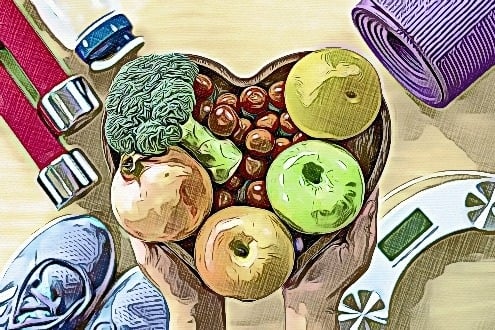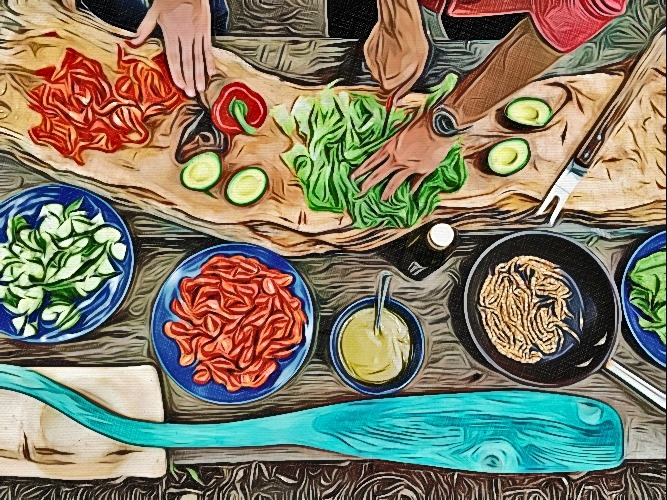6 Low Carb Foods That Clean Your Arteries
It's easy to ignore what we can't see, right. But there's something you need to know if you've been eating a less-than-healthy diet for some time.
We're talking about your arterial health. In this article, we look at 6 of the best foods that can help clean your arteries.
See, just as a poor diet can damage your arteries, a healthy diet and lifestyle protects them.

1 Blood Sugar 'Trick' Keeps Blood Sugar Normal - Try Tonight


.jpg)

6 Low Carb Foods That Clean Your Arteries
What Are Your Arteries—Exactly?
Your arteries are muscular tubes with three layers that act as vital blood vessels. Their job is to deliver oxygen-rich blood from your heart to the tissues around your body. It's your artery's thin inner layer—called the endothelial—that we need to focus on.
Any dysfunction with your endothelial layer can lead to inflammation, which causes scarring. Arterial scaring leads to a buildup of cholesterol and calcium deposits called plaques. It's a process known in medical circles as atherosclerosis.
Beware of Coronary Artery Disease (CAD)
Eventually, plaque buildup narrows the arteries and restricts blood flow to your heart. That's when you have a condition called Coronary artery disease (CAD).
When you have CAD, you may experience severe chest pain or angina. Shortness of breath is another common symptom. And a total blockage can trigger a heart attack or stroke.
Coronary Artery Calcification
If you're concerned about your arteries, consider a Coronary Artery Calcification (CAC) test. If it shows signs of plaque buildup, the foods listed below can help you. But why wait for the bad news. Prevention and arterial maintenance are something you can work on right now.
OK, let's get to the list and uncover the 6 low-carb foods that can help to clean your arteries.
#6 Garlic
Your heart probably loves garlic more than any other vegetable. Its powerful antioxidants protect your cells against damage and fight off infection.
Garlic is an excellent source of plant nutrition. Some of that includes manganese, selenium, and vitamins B6 and C... A single clove also contains phosphorous, calcium, potassium, copper, and iron [1].
Studies found that garlic helps lower your high blood pressure and regulates cholesterol. It's all awe-inspiring stuff, right.
But it’s the research from a 2016 study that really interests us.
The study—published in the Journal of Nutrition—researched the supplement Aged Garlic Extract. The findings saw that it reversed the deadly buildup of plague in your arteries [2].
So, garlic and its preparations help prevent and treat coronary heart disease (CHD).
#5 Berries
Berries add a lot of health benefits to your diet thanks to their high nutritional profile. Think strawberries, blueberries, blackberries, cranberries, and others. And these tasty bite-sized snacks are fruit titans when it comes to caring for your arteries.
Berries contain plant compounds called polyphenols that include flavonoids. The antioxidant effects of flavonoids may reduce risk factors for atherosclerosis. Some examples are irregular blood sugar levels, high LDL cholesterol, and high blood pressure.
Also, the high nutrient content in berries helps reduce inflammation. They also protect your cells from damage and help prevent arteriosclerosis [3] [4].
Research... published in AJCN (The American Journal of Clinical Nutrition) ... found that a daily cup of blueberries over 6 months reduced arterial stiffness. All the study volunteers were adults with metabolic syndrome [5].
#4 Cruciferous Veggies
Your cruciferous veggie crew includes broccoli, cauliflower, cabbage, and several others. Scientists have linked cruciferous plant food intake to improved artery health [6].
It's time to reconsider if these plant foods don't form the bedrock of your heart-healthy diet. They're loaded with healthful vitamins, essential minerals, and powerful antioxidants.
High levels of dietary fiber in these veggies improve your digestive health. Plus, cruciferous plants contain potent sulfur-containing compounds called glucosinolates.
The anti-inflammatory, antiviral, and antioxidant properties of glucosinolates can protect you against atherosclerosis. Research also suggests glucosinolates reduce chronic disease risks, including some cancers [7].
Other studies have linked cruciferous vegetables to reduced arterial calcification. And that lowers your risk of atherosclerosis-related disease [8] [9].
#3 Avocados
Look no further than the avocado for your delicious nutrient-packed low-carb food. It's a perfect complement to your salads, as a sandwich filler and an ingredient for guacamole.
Adding avocado to your diet is so much more than just a delicious food... it's a heart-healthy superfood as well. And here's how it works inside your body.
Research from the public research-I university... Penn State... says an avocado a day can lower small, dense LDL cholesterol particles. Lower LDL helps stop the buildup of plaque in your arteries. Plus, the vitamin E in avocado prevents cholesterol oxidation [10] [11].
Avocados also contain the essential mineral potassium. Potassium eases tension inside your blood vessels and lowers high blood pressure.
#2 Leafy Green Veggies
Say YES to artery-pampering leafy greens like spinach, chard, kale, and arugula. Your body will thank you for it. Their abundance of nutrients can help keep your artery walls clean.
Leafy green veggies deliver many nutrients, such as vitamin A, C, K, fiber, and antioxidants. They're also an excellent source of calcium, potassium, folate, iron, and magnesium [12].
As leafy greens grow, they absorb minerals called nitrates. Dietary nitrates reduce inflammation and improve the function of your blood vessels. And the potassium in leafy greens inhibits vascular calcification... a process that influences atherosclerosis [13] [14].
Numerous studies over several years looked at the heart-healthy benefits of leafy greens. They've shown that a diet rich in these veggies can reduce your risk of heart disease [15].
#1 Extra Virgin Olive Oil
It's official, olive oil consumption... and especially extra virgin olive oil... lowers your risk of Coronary Heart Disease (CHD) and Cardiovascular Disease (CVD). These are the findings of a 24-year study, first published in March 2020 [16].
So how does olive oil work? What's really going on inside your body?
According to scientists, it's all thanks to olive oil's polyphenol compounds. Polyphenols contain powerful health-promoting antioxidants. And it's these antioxidants that support the health of your heart and blood vessels.
To get the highest amounts of polyphenols from olive oil, go for the extra virgin variety. It gives you more anti-inflammatory protection against atherosclerosis than regular oil [17].
A 4-month study... first published in the European Journal of Nutrition... monitored 82 volunteers with early atherosclerosis.
Just 1 oz. of olive oil a day saw substantial improvements in their blood vessel function. Researchers also noticed a significant reduction in inflammatory markers [18].
1 Blood Sugar 'Trick' Keeps Blood Sugar Normal - Try Tonight
1. https://www.bbcgoodfood.com/garlic-nutrition/
2. https://www.sciencedaily.com/aged-garlic-extract/
3. https://pubmed.ncbi.nlm.nih.gov/atherosclerosis-prevention/
4. https://www.ncbi.nlm.nih.gov/berry-consumption-on-CVD-risk/
5. https://academic.oup.com/reduce-arterial-stiffness/
6. https://www.health.harvard.edu/veggies-better-artery-health/
7. https://www.ncbi.nlm.nih.gov/pmc/glucosinolates/
8. https://www.ahajournals.org/lower-ASVD/
9. https://pubmed.ncbi.nlm.nih.gov/protect-against-vascular-calcification/
10. https://catalyst.harvard.edu/avocados-lowers-bad-LDL-cholesterol/
11. https://www.ncbi.nlm.nih.gov/prevents-cholesterol-oxidation/
12. https://www.heart.org/potassium-lowers-HBP/
13. https://www.eatright.org/leafy-greens-nutrients/
14. https://www.ncbi.nlm.nih.gov/pmc/articles/dietary-nitrates/
15. https://www.ncbi.nlm.nih.gov/pmc/dietary-potassium/
16. https://www.ncbi.nlm.nih.gov/leafy-greens-reduce-CVD/
17. https://www.ahajournals.org/lower-CHD-and-CVD-risk/
18. https://pubmed.ncbi.nlm.nih.gov/olive-oil-anti-inflammatory-effects/
19. https://link.springer.com/improved-blood-vessel-function/
Copyright 2021 by CCCeracare. All rights reserved.
This site is not a part of the Youtube website or Youtube Inc. Additionally, This site is NOT endorsed by Youtube in any way. YOUTUBE is a trademark of YOUTUBE, Inc.
